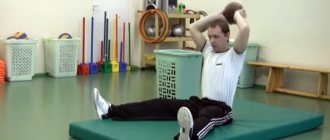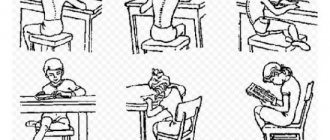Hello friends! We continue to develop on our blog. I’m very interested in how much the human brain is developed. Can anyone tell me what percentage of the brain a person uses in everyday life? Some claim 15, others only 10, some say about 20 percent, and some daredevils claim almost 100%—the entire volume! They, of course, turned it down. But I believe that it doesn’t matter to you and me exactly how much percentage we use. What matters is how to use more! We will look at how to develop the brain, train it and become mental athletes in this article.
How much can you develop your brain?
I was always surprised by people who accurately memorized a huge number of numbers, cells, facts and a bunch of other things. These are some kind of celestial beings, I thought. But what was my surprise when my own daughter, at the age of 3, began to give out various facts from life, numbers, poems from memory and incessantly! And this is just a few months of the children’s game “Guess it” (guessing the location of pictures from memory).
As researchers of the human main computer say, anyone can upgrade their brain if they want. Remember the story of Nelson Dellis, four-time winner of the US Memory Championships. He claims that his memory was simply terrible when he decided to train her. And, voila, a championship winner!
For reference: Dellis began training brain activity by memorizing the order of cards in a deck within 20 minutes. Today, the speed of memorizing 52 cards is only 30 seconds! And this is not the only case of such successful training. Scientists say that in just 30 days, with intense training, you can achieve unrealistic memorization results!
It turns out that you can develop your brain as much as you want! It all depends on what task you are facing. For example, if you need to remember quickly, work hard to develop your memory. And if it is important for you to concentrate as much as possible on your work, intensively develop your attention.
Therefore, remember the main thing: you can and should train your brain, and there is no limit to such training, just as there is no limit to your perfection!
Preparing the brain for development
So that you understand how the development of brain abilities occurs, I will introduce you a little to the secrets of this organ. Be patient, without knowledge of some aspects of physiology, you will get nowhere.
You live and constantly come across some information, learn something new, gain experience based on situations you have already lived through. If any information turns out to be useful to you, it is stored in the brain while it is still needed. When it becomes irrelevant, the brain does the dirty work and erases it without your consent. So, this information is absorbed and processed by mental processes.
These processes depend on the functioning of the brain: memory of an adult and a child, thinking, attention, imagination, speech, self-awareness and some others. And its work is based on the coordinated interaction of the right and left hemispheres - the main parts of the brain. They are connected to each other by a callosal substance, which, like a bridge, transmits information to the “right shores” in the right departments.
As a rule, when one hemisphere is damaged, the other also suffers. But there are cases when the functions of the right hemisphere were taken over by the left and vice versa. Why are they so special and why are both extremely important for humans?
The left hemisphere (LH) is responsible for the following functions:
- logical thinking;
- analysis of information in strict sequence;
- data processing;
- working with numbers.
The right hemisphere (RH) is responsible for:
- creative thinking;
- sensory perception;
- orientation in space;
- creative thinking;
- making non-standard decisions, solving puzzles, exercises.
When we talk about preparing for brain development, we take into account both hemispheres or the one that is less developed. And now, probably, everyone is tense and thinking, how can we now find out which hemisphere of the brain is better developed?! But don’t worry, I also asked myself this question and found the answer to it - the test “Which hemisphere of your brain is more developed.”
I passed this test - by the way, a very entertaining activity! My left hemisphere turned out to be the dominant one, what is yours? It will be very interesting to read about your results in the comments.
And a few more important points in preparing the brain for training:
- Move more. A sedentary lifestyle prevents good blood circulation and the brain receives less oxygen. Where can he get the strength for classes and exercises? If blood and oxygen are poorly supplied to the brain, get ready for disruption of the functions of the main thinking organ! Do you need it? Therefore, quickly grab the rope and move the blood through the vessels!
- Provide your brain with nutrients. It is important that phosphorus and healthy carbohydrates enter the body. Pumpkin, nuts, bran, kefir, fish, oats, beans, cheese, sesame seeds, rice, milk - all this is suitable. It has also been proven that alcohol destroys brain neurons, so keep this in mind at your next corporate event!
- Drink more water! This is extremely important for cleansing the body of waste and toxins. And for the brain you do a double benefit: you help blood flow and improve cognitive functions, because water perfectly supports neural communication! Over time, you will notice that it has become much easier for you to remember things.
Considering all these rules, I am sure that you will be able to develop your brain to its maximum! The main thing is persistence and diligence. And now we move on to the most important and interesting section of the article.
Creative thinking and exercises for its development
With this type of thinking, a person finds a new, completely different solution to a standard problem. Unconventional thinking is a combination of resourcefulness, enterprise, a sharp mind, and the use of non-standard mental connections.
By using this way of thinking, you will significantly increase the speed and efficiency of assimilation of new knowledge.
You will be able to easily move from one type of work to another, find the best solution in the most difficult situation, and come up with something fundamentally new and interesting. In the classical sense, this is the basis of creative thinking.
Another name is divergent thinking - finding many options for solving one problem.
How to develop unconventional thinking - follow a few recommendations:
- try to find a new way to solve the daily routine of tasks
- norms and rules are good, but to think outside the box, you cannot blindly follow them
- Traveling not only broadens your horizons, but also literally expands your inner thought channel.
- try to learn new, useful and interesting information every day
- work on developing a new skill every day
- strive to do something better than everyone else (not to be confused with perfectionism)
- sometimes brainstorm to find the best solution to a problem
- get acquainted with the concept of synectics
In addition to recommendations, exercises to develop lateral thinking will help you:
- Write down a few words for yourself and try to find for each one as many nouns as possible that define the essence of these words. Example: evening, mother, holiday, cat.
- Now make pairs of the most dissimilar words and write down the maximum number of related features for them. Example: newspaper - bush, sausage - cream, bow - chair.
- Imagine several unusual situations and mentally develop the events that will occur. Example situations: “a UFO landed in the yard of your house”, “instead of rain, marmalade candies are falling”, “instead of winter, it’s hot outside for three months”
- Look around and choose the item you like. Make up 5 suitable and 5 opposite adjectives for it
- Make a list of 10 purchases that you will definitely make before the end of the world
- Now make a list of 100 goals for your entire life.
- Take a piece of paper and write yourself a message that you will read in 10 years.
For those who love gaming and online formats, there are good web resources for training creative thinking.
Logical tasks, games, exercises that develop the brain
Logic is very closely related to other thought processes. Logical thinking is extremely important for many professions, especially programmers, investigators, teachers, engineers, managers and other equally important specialists.
Logical tasks effectively train the brain, as you need to find something new, compare, and analyze. All logical tasks and games that develop the brain are built on several principles:
- eliminating unnecessary things;
- search for commonalities;
- identifying patterns;
- riddle solving;
- study of spatial positions;
- comparison.
I will give examples of some logic exercises, games and tasks.
Tasks
There were 3 birch trees growing in the clearing. Each tree has 7 branches, and each branch has 2 more branches. There are 2 apples on each branch. How many apples are there in total?
A person will strain and push in order to have time to count all the branches. But the catch is that apples don’t grow on birch trees!
A bottle with a cork costs 1 rub. 10 kopecks The bottle itself is exactly 1 ruble more expensive than the cork. How much do these two items cost separately?
You, like me, immediately thought about 1 rub. and 10 kopecks? But no, this answer is wrong. If this were so, then the difference between them would be 90 kopecks, which already contradicts the condition. It turns out that a bottle costs 1 rub. 5 kopecks, and a cork - 5 kopecks. Then the condition is met.
Games
It’s great to practice your logic at any age with the help of logic games. So that you don’t stress and search for them on the Internet, I did it for you. On the BrainApps website you will find 15 games that develop logical thinking. I will give 3 examples.
Anagrams - successfully completing the game trains several skills: memory, logical thinking, testing different theories, verbal intelligence. A bonus for completing the game will be the development of creativity. The player needs to read the original word and find the correct variant in the anagrams below that matches all the letters in a short time.
360 degrees – develops spatial thinking, without which it is difficult to see the depth, volume of objects and their interaction. The game improves logical thinking operations, improves creativity, and helps speed up thought processes. Rules: you need to understand whether the picture has changed after rotation. 2 options are given, where the player chooses the correct one.
Quick addition - you need to select several addends so that the sum is equal to the specified number. The game develops logic, speed of thinking, creativity and concentration.
Exercises
Exercises are often given as a whole block in pictures. They are intended more for children in psychological or speech therapy practice, but adults will also find it useful to use them for their development. I will give an example of several of them.
Exercise “Continue the row.” You need to continue the series according to one attribute. For example: vacuum cleaner, coffee maker, washing machine,... The correct answer would be a microwave oven or a multicooker, since household electrical appliances are considered.
Exercise “Find commonalities.” Several words are given that, at first glance, are not related to each other. But you need to find what unites them. For example: boy, chicken, champignon,... What do they have in common? The fact that they grow is living organisms.
Exercise “Eliminate the unnecessary.” Images of 5 shapes are given: a red circle, a green triangle, a red square, a blue rectangle and a blue trapezoid. What's missing here? And in this exercise there are two correct answers: a blue rectangle or a red circle. Circle because there are no corners. Triangle, since there are no more green shapes.
Classification of types of thinking
According to mental processes
- Visual-effective - the development of this type of thinking occurs in infancy. It is used by a newborn and up to 1.5 years
- Subject-specific - solving a problem using a specific object. This type of thinking is formed during the age period from early childhood to preschool age (1.5 years - 7 years)
- Visual-figurative - reality is transformed into images. This type of thinking is predominant in children from 3 years of age to primary school level.
- Abstract-logical - allows a person to think in non-existent categories and abstractions. This type of thinking is formed from the age of 7.
According to the results
- Creative
- Reproductive
According to the level of mental processes
- Analytical
- Intuitive
Other varieties
- Algorithmic
- Alternative - when a person has several opinions and options for action at once. At the right time, he chooses the most preferable and correct option.
- Associative
- Visual
- Critical
- Non-standard
- Figurative
- Positive
- Practical
- Emotional
For a complete list of types of thinking, see
Puzzle movies that are great for training your brain
In addition to special exercises, creative people have come up with stories and made films that develop the brain. I have selected for you the top 15 films that will make you wiggle your brains to understand their logical chains:
- “The Beginning” - you will be confused in dreams, which will force your brain to work at full capacity.
- “12 Monkeys” - you will watch the film tensely until the end, trying to understand the plot.
- “The Game” is a difficult film to understand, but it pumps up the brain well.
- “Initial move” is your option if you want to use your brain and feel the romance.
- “Interstellar” – space is connected with ordinary things: love, family, betrayal.
- “The Illusion of Deception” – I highly recommend it! You will get aesthetic pleasure, but you will also have to work hard to understand the logic of the film.
- “The Curious Case of Benjamin Button” is a very interesting film that will change your worldview.
- “Hour of Reckoning” is an ordinary picture with a twisted ending.
- “The Butterfly Effect” is a slightly heavy psychological film with deep meaning.
- “The Matrix” is a sensational film that makes you think.
- “Déjà vu” is a repetition of different stories, the film keeps you in constant suspense.
- “Fountain” makes you re-evaluate familiar things.
- “Mulholland Drive” is an interestingly shot picture that the viewer needs to piece together.
- “The Jacket” - this film will definitely not leave you indifferent; it exudes calmness, although you have to think a little.
- “Mr. Nobody” makes you think about your daily choices.
How to pump up your brain using online trainers
Practice develops the brain best. So I want to offer you powerful practical tools for pumping up all mental processes. A pleasant bonus for you will be that you can do this without even leaving home. Catch two of the most popular and effective resources where you can develop your brain online.
- Vikium
Here you are offered 80 simulators. On the site you will see sections in which you can train your memory, thinking, and attention. Developers take into account your individual abilities and needs.
In addition to the programs, there are courses in which you will learn to read quickly, memorize large chunks of text and any other information, and also learn to understand others, have self-control and successfully interact with people.
To spark your interest in sports, you can go to “Competitions”, where you can duel on a specific topic with any participant. This stimulates you to develop better, remember and work on yourself.
You will be provided with an individual program. Read more about the site's capabilities here, and we will look at several simulators that train logic.
Logical comparison - helps to train mental calculations, you will learn to better navigate texts and can easily complete the task you started.
Spatial comparison - trains you to assess the situation from the outside, keeps your brain in good shape, you will gradually forget about errors of attention, absent-mindedness, and will be able to retain a lot of information in memory at the same time.
Continue the series - trains verbal logic, you will learn to navigate the text more easily, and also quickly calculate the cost of purchases in your head, and solve many problems in a short time.
- BrainApps
Immediately after registration, you will be tested in the form of games to determine the level of development of your mental processes. You will also find 8 psychological tests that will help you learn new things about yourself.
The topics of the courses have something in common with Vikium, but they are structured differently, so no one is stopping you from “taking the cream” from two sites at once. All the simulators are made in the form of games, you go through them quite quickly, which motivates you to further develop.
Complex sorting is a training game where from the given options you need to choose the one that matches the sample in color and shape. You sort all the shapes shown. Trains attention switching and logic.
Submarines. You need to quickly answer a question about boat movement. Trains speed and logic of thinking, memory and attention.
Money box. Here you need to visually assess the amount of money in each of the 2 piggy banks and choose which is more or less. It is very exciting, in addition to being interesting, it trains the speed and spatiality of thinking, memory and logic.
Signs of Low Emotional Intelligence
There are a number of signs that suggest a person has low EQ:
- lack of self-confidence;
- indecision;
- complex;
- isolation;
- difficulties in communicating with other people;
- envy;
- tendency to condemn and criticize;
- negative thinking.
To more accurately determine your EQ, it is best to take tests. There are many of them on the Internet. You should choose high-quality tests, with a sufficiently large number of tasks and a detailed interpretation of the result. In the meantime, I suggest you take a short test suggested in the next video.
If suddenly you don’t get a very good result, don’t rush to get upset, emotional intelligence can be developed. And I’ll tell you how to do this further.
Books
If you love to read, then books for brain development are your everything! Below I will describe the most popular and useful works in this topic.
- Richard Nisbett “Brain accelerators. How to learn to think effectively using techniques from different sciences” (electronic version on liters).
- Roger Sipe, Brain Development. How to read faster, remember better and achieve greater goals” (electronic version on liters | paper version on labirint.ru).
- Anton Moguchiy “The most popular training book for brain development! New training for the mind.”
- Charles Phillips “Super Trainer for the Brain” (electronic version on liters | paper version on labirint.ru).
- Richard Galland, The Puzzles of Sherlock Holmes.
- Joe Dispenza “Grow your brain. How to reconfigure your mind and realize your own potential” (electronic version on liters | paper version on labirint.ru).
- Ryuta Kawashima “Japanese system for the development of intelligence and memory” (electronic version on liters | paper version on labirint.ru).
- David Rock "Brain" Instructions for use” (electronic version on liters | paper version on labirint.ru).
- Joel Levy “Charges for the brain. Raise your IQ!” (paper version at labirint.ru).
- Matthew MacDonald “Teach your brain to work” (paper version on labirint.ru).
Tatyana Chernigovskaya “How to train the brain, memory, thinking” is a video that clearly describes the basic principles of brain training.











